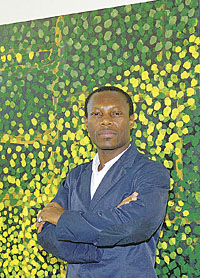For more archives, go to the Advance Archive/Search Page.
Oguibe's New Book Explores
Culture, Theory In Visual Arts
The walls of Olu Oguibe's studio are dotted with his paintings, but several canvases, rich with red and black, command a certain presence.
"They're about prison abuse," says Oguibe, associate professor of art and art history. "I've lived under several dictatorships, and quite a number of my friends spent time in jail. It is something that has always been a concern to me." Over the years, Oguibe has been involved in several campaigns on behalf of prisoners of conscience.
 |
|
Olu Oguibe, an assocaite professor of art and art history and
African-American studies, stands in front of one of his paintings,
"ew England Summer, 2004," that is on display in the Fine Arts Building. |
Portraits of Amelia Earhart, Indira Gandhi, and Aretha Franklin line another wall in the studio. Oguibe created them for a project called "Women of Substance."
Born and raised in Nigeria, Oguibe joined the UConn faculty in 2003 with a joint appointment in art and art history and African-American studies.
He is an artist, art historian, critic, exhibitions curator, poet, musician, and author - in short, a Renaissance man. "If I'm interested in something, I do it," he says. "I suppose you'd say I'm promiscuous in terms of experiences. If it has something to do with the intellect, I'm drawn to it."
Oguibe, who teaches art history, painting, drawing, and theory, says he has always been interested in African-American culture - "from way back, when I was a little kid in West Africa," he says. "When I was 10 years old, I read about George Washington Carver and was blown away. I wondered how someone under the circumstances could achieve so much."
The author of several books, Oguibe has a new one this year: The Culture Game. It is a collection of essays written during the past 10 years that represent his contributions to debates on culture and theory, particularly in the visual arts.
His essays explore the differences in the way Western and non-Western artists are received; the obstacles faced by non-Western and minority artists; and the nature and concerns of non-Western art.
"Artists who come from backgrounds outside of the U.S., for example, even though they may have been born and raised here, discover that their most valued attribute is their difference," Oguibe says. "They are expected to create work of a certain nature, to show in certain spaces, and to pursue certain themes. It may just be that their parents were born elsewhere, and for that simple reason the Western art establishment expects them to make a different kind of art. And every 10 years, a particular gallery or museum may hold an African, Asian, or Latin-American exhibition, and then feel no further obligation to show these artists."
Oguibe's concern about the use of stereotypes by some African-American artists is reflected in an essay called "Represent'n: The Young Generation in African American Art."
"There are certain artists who are creating work that perpetuates stereotypes," Oguibe says, "but they think they are confronting those stereotypes by using satire, such as imagery of Aunt Jemima. Some viewers, particularly younger ones, might not realize that the imagery is being used to criticize."
Oguibe's works have been shown in one-person and group exhibitions in major galleries and museums around the world, including the Smithsonian Institution in Washington, D.C., and the Whitney Museum of American Art in New York City. He also has worked as an international curator and consultant on contemporary art at places including the Tate Gallery of Modern Art in London.
Oguibe's prison paintings are currently on display at The William Benton Museum of Art, as part of the faculty exhibition. The show runs through Oct. 10.
A one-person exhibition of his work, Olu Oguibe: An Introspective, will take place Oct. 11 through Nov. 12 at the Contemporary Art Galleries in the Fine Arts Building.
Before coming to the University, he was a senior fellow of the Vera List Center for Art and Politics at the New School in Manhattan. He graduated first in his class from the University of Nigeria in 1986, and received his doctorate in the history of contemporary art from the University of London in 1992.
Since 1986, Oguibe has taught at colleges and universities including the School of Oriental and African Studies; Goldsmiths College, University of London; the University of Illinois at Chicago; and the University of South Florida, where he held the Stuart Golding Endowed Chair in African Art.

